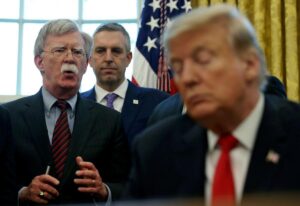In the ongoing geopolitical chessboard of the Middle East, the conflict in Yemen continues to be used by U.S. administrations to justify broader strategies against Iran. To explore this narrative from a different perspective, we spoke with two prominent independent voices: American citizen journalist Nick, co-founder of the Revolutionary Blackout Network, and Iraqi writer and politician Hussein Salem. Their insights offer a deeper understanding of Washington’s rhetoric on the Houthis and its broader implications for Iran.
Turning Yemen into a Battlefield for U.S.–Iran Confrontation
Question: Is Trump’s accusation against Iran for the Houthis’ attacks merely a pretext to escalate military tensions against Tehran?
Nick: The White House and the United States always try to claim that Yemen, which is controlled by Ansar Allah or the Houthis, is actually being controlled by Iran in order to justify escalating tensions with Iran, while at the same time erasing the legitimate claim that Ansar Allah has to govern Yemen. They want to paint the Houthis as a terrorist group that illegally took over the country, but they have popular support, they control the capital, they are the legitimate state. So claiming that they are working on behalf of Iran makes it so they can claim that Yemen is not a real state, so they can bomb them and get away with any sort of war effort against the country.
Hussein Salem : Yes, this is a recurring American tactic that relies on unfounded accusations as a cover for provocative actions. The Trump administration—and those that followed—have consistently used this strategy to build international consensus in support of hostile measures against Iran.
Reality vs. Propaganda: Assessing the Impact of U.S. Strikes on the Houthis and Iran
Question: How can the White House claim that strikes against the Houthis have weakened Iran, while providing no clear evidence?
Nick: You asked how can the White House claim the strikes against the Houthis weakened Iran without claiming evidence. That’s how United States foreign policy generally works as a whole. They always claim that there was success, that the United States military is successful because that’s how they sell never-ending war and conflict against United States enemies. If they were to tell the American people that their strikes against Yemen cost us hundreds of millions of dollars with little success, they know that many Americans would turn on United States foreign policy. So it’s important for the White House, for propaganda purposes, to claim that they are every single war when that is not true. They claim the same thing in Ukraine. They claim that Ukraine was defeating Russia until they can no longer credibly get away with that. When it comes to their military operation against Yemen, the Houthis, they have failed to take out their military capacity. They have managed to commit massive atrocities, kill a lot of people, but that’s not the same as accomplishing the military goal.
Hussein Salem : This is part of the psychological and media warfare orchestrated by Washington. The U.S. seeks to portray any military escalation against Iran’s allies as a strategic victory. However, the reality on the ground may be entirely different. Iran possesses a broad range of political and military tools that go far beyond the Houthis, so targeting them does not necessarily equate to weakening Iran.









